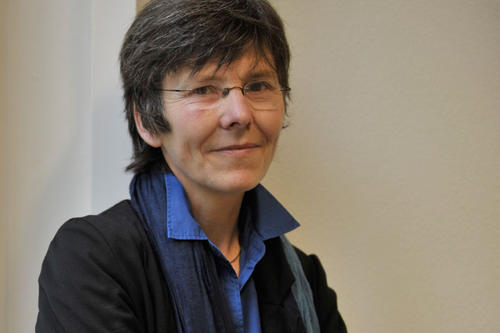Shedding Light
Mathematician Hélène Esnault named first Einstein Professor at Freie Universität
Oct 30, 2012
A transfer that was celebrated among Berlin researchers with as much enthusiasm as elsewhere a newcomer in major-league sports: Hélène Esnault is considered one of the most influential mathematicians of the world.
Image Credit: Bernd Wannenmacher
Hélène Esnault is considered one of the world’s most important mathematicians. On October 1, 2012, the 59-year-old scholar took up her position as the first Einstein Professor at Freie Universität. With her work on number theory, the university hopes she will expand on a field of mathematics that has not been among the focuses of research in Berlin so far. French-born Esnault also wants to change that. “Berlin, and especially East Berlin, had a long tradition in this field,” she explains.
Esnault’s research is in the discipline of Diophantine mathematics, an area that lies between number theory and algebraic geometry. With a comparative approach that embraces the disciplines of pure mathematics, Esnault has been able to make significant advances in a number of unsolved questions in mathematics.
“You set up analogies, more or less. Then you can try to take findings from geometry and topology and apply them to arithmetic – and vice versa. This kind of approach can also sometimes help to solve problems that previously seemed out of reach,” Esnault explains. Then she adds a declaration of her love for the abstract discipline of mathematics. “You are constantly discovering new aspects of a certain area, new questions, the secret is always shifting. It’s like love.”
Esnault discovered her own love of pure mathematics at an early age. After earning a degree in mathematics at the elite École Normale Supérieure (ENS), in Paris, and completing her doctorate, she worked initially as an assistant at the University of Paris VII and then, in 1983, moved to Germany to work as a guest scholar at the Max Planck Institute for Mathematics, in Bonn, one of the main centers of research in pure mathematics. After completing the postdoctoral Habilitation that would authorize her to teach at a university in Germany and after further stints in Paris and Bonn, Esnault was named chair of analytical geometry at the University of Duisburg-Essen in 1990.
Esnault spent years at the University of Duisburg-Essen, along with her husband, Eckart Viehweg, who also held a chair in mathematics there until his death, in 2010. Together, Esnault and Viehweg helped the department to grow, expand, and make an international name for itself. In 2003, the German Research Foundation (DFG) awarded its Leibniz Prize – considered Germany’s most important academic award – to the two researchers. “That was definitely the award that made the biggest impact,” Esnault says today. Research funding, cooperative initiatives, grants – suddenly, more was possible in this area than previously.
When people point out to Esnault that she is often referred to as one of the leading lights in her field, she responds simply, “That’s very nice.” Instead of commenting further, she prefers to quote Belgian mathematician Pierre Deligne, whom she holds in great esteem, not only for his work, but also for his analogies for mathematical research. “We can only see things where there is light to see them by.” So when light has already been shed on another area of mathematics, scholars there try to draw analogous conclusions – so that they can also see something even where it is still dark. “When you succeed in doing that, it brings tremendous joy that infuses everything in life.”
Further Information
Prof. Dr. Hélène Esnault, Freie Universität Berlin, Department of Mathematics and Computer Science, Email: Helene.Esnault@fu-berlin.de

